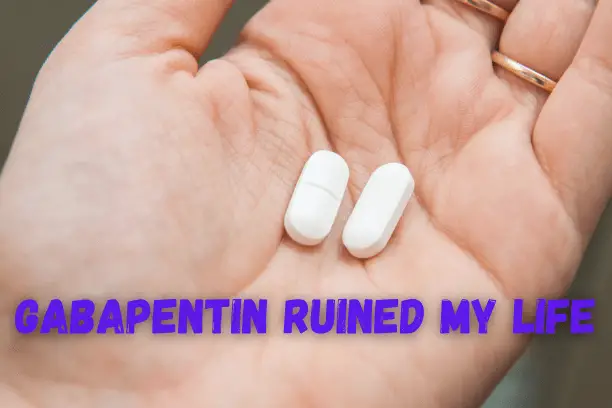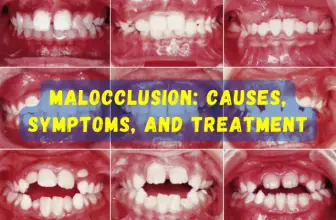Gabapentin Ruined My Life: A Narrative of Unexpected Challenges

In the world of medications, despite serving beneficial purposes, some medicines become hazardous for some reason. Thus, Gabapentin ruined my life.
No doubt, gabapentin is effective in many cases, but it is nothing but a nightmare for me now. I was going through a severe depression while on GBP. Not only that, it also affected my conjugal life. The most shocking thing was I became unemployed, alone and isolated for a long time due to the medications. You will be surprised to know that after taking the medicine, I was in such a state that I wanted to commit suicide.
In this article, I will tell you how this medicine brought me to this position. Also I will share some real-life stories on how this painkiller destroyed others lives. I will also share why the issues arise, what we should do, and what not to do.
How Gabapentin Ruined My Life?
In January 2015, I started taking GBP to relieve some medical complications, everything seemed fine. But after a long time of taking it, I realized that I was experiencing less concentration in my workplace. Like I had to operate machinery; I needed concentration, which I failed to provide properly. Not only that, I started feeling less attracted to my partner. As a result, I thus lost my job and ended my long-term relationship at the same time! I was very disoriented, distressed and disappointed. At first, I was clueless about why this was happening. I suspected that gabapentin might be responsible for this. But I was in doubt. So I went to the doctor.
I shared my condition, medicines and also the doubts regarding GBP. Still, thedoctor told me that these are not for medicine. He advised me to consult a psychologist. He prescribed me some anti-depressants and sedatives. And guess what! My mental state worsened! Then I started joining some groups on social media, and told my story on a social media platform. I connected with the people who were going through the same condition. Also I learned the side effects of all the medicines I was prescribed. And eventually it was found that gabapentin could be a cause of my mental sufferings. And I withdraw GBP as soon as possible. You’d be surprised to know, even after I stopped taking the medication, I still suffered mentally and realized how much it affected me that it took a long time to get over it. However, after about 2 years I feel like I am recovering. And now I am back to a normal life but I will never forget the struggle I went through.
What Is Gabapentin?
Here’s a description of Gabapentin with the requested details, presented in bullet points:
Treatment:
The doctor prescribed the medicine to treat epilepsy and neuropathic pain. Moreover, the medicine treats brain overexcitement conditions like shaking-related pain, epileptic seizures, restless leg syndrome, diabetes-related tingling, hot flashes, and alcohol withdrawal symptoms. Also it reduces anxiety by stimulating GABA production.
Origin:
- Developed by Parke-Davis.
- First approved by the FDA in 1993 under the brand name Neurontin.
Class:
Anticonvulsants or antiepileptic drugs.
Type:
- Affects neurotransmitter transmission in the brain.
- Helps control seizures.
- Alleviate neuropathic pain.
Form:
- Oral forms, including capsules and tablets, for easy ingestion.
How Does Gabapentin Work?
We already know that Gabapentin affects the activity of neurotransmitters. Gamma-aminobutyric acid (GABA) is certainly one of them. In fact, it is an inhibitory neurotransmitter. It controls the transmission of signals between nerve cells. The medicine increases the production of GABA. And enhance its effects.
By doing this, it reduces the excessive firing of nerve cells that leads to seizures. Moreover, it contributes to neuropathic pain. This is why GBP is effective in treating epilepsy and neuropathic pain conditions.
The Consequences of Misusing Gabapentin: Story of A Victim
Misusing Gabapentin has serious health risks. A victim Camilo Moore told that using gabapentin he started to feel dizzy, and faced some mental health issues due to overdose. Sometimes you may take higher doses or use it more often than prescribed.
Consequently, it reduces the effectiveness of other medications and increases dizziness. Again, overdose causes adverse mental health effects, dependency, and addiction. Overdose of the medication interacts with other substances.
Therefore, it’s essential to use Gabapentin only as prescribed to avoid these potential hazards. However, it rarely interacts with natural herbs like moringa. Even though the plant supplement contains sedative elements.
Gabapentin Causes Sexual Disability: Told By a Patient
Gabapentin is a medication that affects sexual health—this was told by a male patient taking GBP for a more extended period. He said that after a certain period, he lost interest in getting intimate with his partner. That was affected his conjugal life. Not only him, but many patients notice changes in their sexual function and desire when taking the medicine. Some of the sexual side effects due to GBP are as follows:
- Decreased Libido: Some experience reduced sexual desire while taking the medicine.
- Erectile Dysfunction (ED): For men, the medicine causes difficulties maintaining an erection. For example, 900 mg of GBP daily consumption causes problems like ED.
- Orgasmic Dysfunction: Both men and women fail to have orgasms.
GBP 300 mg is used for nerve pain, seizures, and restless leg syndrome. But only consuming this much GBP causes problems like loss of libido, anejaculation, anorgasmia, and impotence. Also it may cause dizziness after ejaculation.
Gabapentin Causes Sudden Death: Real Life Incidents
These are shocking facts, but people have recently started consuming medicine for recreational purposes. Surprisingly, sudden death has increased for this certain medication. Though consuming GBP rarely causes death but it happens for some reasons. Gabapentin overdose consumption and interaction with alcohol or a few substances cause death as follows:
- Alcohol Antihistamines: Benadryl and Claritin.
- Benzodiazepines: Xanax or Valium.
- Sleep medications: Ambien and Lunesta.
- Opioids: morphine and OxyContin.
Opioids also interects with the medications like Robitusin and Nyquil.Through the interactions among them rarely cause death, it’s better to avoid the above substances while you are on GBP medication.
Research according to the National Library of Medicine:
The NIH reviewed 104 unusual cases that tested positive for Gabapentin. Surprisingly, among them, 53 suspected motor drivers were found. All of them tested positive for GBP. 47.1% of deaths happened due to GBP.
Notably, antidepressants, antianxiety, opioids, and over-the-counter medicine were also present. The blood concentrations ranged from 1.1 to 134.0 mg/L. Though the GBP was legitimate for 91.4%, 84.2% misused the medications and consequently caused death.
Gabapentin Causes Brain Damage in Children
A mother whose baby is the victim of GBP complained that her baby became restless, aggressive and also lacked concentration.
Children who use Gabapentin for a long time cause serious side effects. Side effects of GBP in children are drowsiness, dizziness, and unsteadiness. Additionally, when children first start taking the medicine, they face other side effects. Moreover, restlessness, irritability, aggression, and anxiety are the common side effects in children you may see. Also, increased nervousness, hyperactivity, or poor sleep.
What’s more, some children experience changes in school performance, concentration problems, crying, depression, distrust of others, a false sense of well-being, and hyperactivity. Also, the medication in children increases body movements, rapidly changing moods, reacting too quickly or overreacting, and restlessness. In rare cases, Gabapentin cause tantrums, aggression directed toward others, hyperactivity, and defiance.
Gabapentin Ruined My Teeth: Customer Complaints
Now that you know how Gabapentin ruined my life, read what others have been saying about this painkiller.
A woman named Stella Brown said she has been on Gabapentin since 2018, and her teeth have rotted from the inside out.
Another sufferer states that he lost enamel and tops from some of his front top teeth after the first three years. He has been taking this medicine for 17 years. As a consequence, he has to remove his front teeth. Also, he has a very aggressive gum disease problem. Plus, he suffers from excessive bone deterioration around his teeth; up to a centimetre of tooth support bone is gone.
Joseph Campbell, a 45 years old man, regrets taking Gabapentin as he lost all his teeth.
In a new study at the University of Rochester Medical Center’s Eastman Institute for Oral Health (EIOH), researchers state that GBP, combined with ibuprofen or acetaminophen, was more effective than opioids in relieving pain after tooth extractions. But from the actual incidents, we learn how GBP can ruin your teeth. It causes dry mouth. Consequently, tooth decay happens fast. Teeth start to rot inside out. Not only that, they even break off. That’s why long-term consumption of Gabapentin may ruin your teeth.
Gabapentin Side Effects
Long-term use of GBP causes adverse side effects. You may wonder why Gabapentin is such a bad drug. It’s because some long-term side effects of GBP may include:
- Drowsiness and Dizziness.
- Tend to suicide or self harm.
- Memory and Concentration Issues.
- Weight Gain.
- Mood Changes.
- Peripheral Edema.
- Muscle Weakness.
- Withdrawal Symptoms like anxiety, insomnia, and restlessness.
- Develop tolerance to the effects of GBP. It requires higher doses to achieve the same results.
- People develop a psychological or physical dependence on GBP.
- Renal Issues.
The issues listed above are the signs of Gabapentin toxicity. When you are on this painkiller and feel any of the problems, consult your doctor ASAP.
How to Treat Side Effects of Gabapentin?
Here are some general strategies to manage the side effects:
Drowsiness and dizziness:
- Take the medicine at bedtime to minimize the impact of drowsiness.
- Avoid activities that influence the side effects.
- Increase the dosage gradually to allow your body to adjust.
Nausea or vomiting:
- Take Gabapentin with food to reduce stomach upset.
- Split the dosage into smaller, more frequent doses throughout the day.
Dry mouth:
- Stay hydrated by drinking plenty of water.
- Chew sugar-free gum or suck on sugar-free candies to stimulate saliva production.
Constipation:
- Increase your fiber intake. Consume fruits, vegetables, and whole grains.
- Stay hydrated.
- Engage in regular physical activity.
Memory problems:
- Keep a journal. Use reminders to improve memory and help the organization.
- Practice good sleep hygiene to improve cognitive function.
Other side effects:
- Adjust the dosage, and switch medications if needed.
Exploring Gabapentin Dose to Avoid Side Effects
The recommended dose of Gabapentin for adults and children depends on the condition. Here is the dosage information from the search results:
Dosage for adults:
| Consumption stage | Dosage range | Frequency |
| Initial dose | 300 mg orally | 3 times a day |
| Maintenance dose: | 300 to 600 mg orally | 3 times a day |
| Maximum dose: | 2400 to 3600 mg | Per day |
Dosage for children:
Children 3 to 11 years of age: The starting dose is 10 to 15 mg/kg
According to body weight per day, divided into three doses
Children younger than three years of age:
Use and dose must be determined by a doctor
Dosage for Postherpetic Neuralgia:
Typical starting dosage: 300 mg per day. The dose is gradually increased over a few days as follows:
- Day 1: 300 mg
- Day 2: 600 mg (300 mg twice a day)
- Day 3: 900 mg (300 mg three times a day)
The maximum dosage is 1800 mg per day.
Form and Strengths
Generic: Gabapentin
Form: Oral capsule
Strengths: 100 mg, 300 mg, 400 mg
Brand: Neurontin
Form: Oral capsule
Strengths: 100 mg, 300 mg, 400mg
Gabapentin Side Effects for Dogs
Like all medicines, there is little chance that a dog will experience an allergy to it. In this situation, don’t use it on your pet. In addition, as it takes longer to metabolize in animals with liver or kidney illness, gabapentin should be taken cautiously.
Gabapentin Side Effects for Cats
Owners of cats should be aware of the following gabapentin side effects:
- Dizziness
- Nausea
- Vomiting
- Diarrhoea
- Incoordination
- Disorientation
If you see any of these symptoms, contact your veterinarian to discuss if the medication needs to be stopped or adjusted in dosage.
Dos and Don’ts While on Gabapentin
When taking Gabapentin, it’s important to follow your doctor’s instructions. Following some dos and don’ts the medication will not ruin your life. to avoid side effects consider the following dos and don’ts:
Dos:
- Take Gabapentin treatment exactly as prescribed by your doctor.
- Take the medicine with an empty stomach or after eating. But taking it with food reduces the chance of stomach upset.
- Drinking plenty of water while taking the medicine. It prevents dehydration and also keeps the mouth moist. as the medicine makes my mouth dry.
- Take your doses at the same time each day. As a result, you can maintain a consistent level of medication in your body.
- Keep track of how your body responds to GBP.
Don’ts:
- Adjusting the dose on your own leads to side effects. Hence, do not change the dosage without consulting a doctor.
- Alcohol enhances the sedative effects of Gabapentin. It’s best to avoid alcohol while taking this medication.
- Gabapentin impairs your ability to drive or operate machinery. Avoid such activities until you know how the medication affects you.
- Stop taking the medicine under the guidance of your doctor. Otherwise, suddenly stopping the medication will not help you to recover completely.
Gabapentin is a prescription medication for your specific condition. So, don’t with others, as their medical needs may be different.
FAQs
Is Gabapentin blood thinner?
No, Gabapentin is not a blood thinner. It is a primary medication to treat seizures and nerve pain, even if there are no interactions between the medicine and the blood thinners.
Can Gabapentin and Benadryl together cause death?
Gabapentin and Benadryl should not be taken together without the suggestion of professionals. After all, both of them are sedatives. In fact,both have sleep-inducing formulas. And causes drowsiness, dizziness, confusion, and difficulty concentrating. They both interact with each other. So taking them together reduces their effectiveness. Thus, overconsumption of both causes death.
Does Gabapentin mess you up?
Gabapentin has both positive and negative effects. While it’s prescribed to treat epilepsy and nerve pain, some people experience drowsiness, dizziness, and coordination difficulties. Others may find relief from their symptoms without significant adverse effects. The impact of the medicine varies from person to person, so it’s essential to discuss any concerns or experiences with a medical professional.
Does Gabapentin affect memory?
A study by NIH conducted on rats found that GBP has no effect on the brain for long-term consumption. Evidently, Gabapentin alone never causes memory loss or memory impairment. Also people with spinal injuries, if they take GBP, may face memory loss, brain fog, and slight confusion. You may face some problems regarding the brain after taking Gabapentin, but those are not severe as dementia.
Conclusion
Sharing personal experiences raises awareness. That’s why I share how Gabapentin ruined my life. However, Gabapentin’s impact on an individual’s life varies greatly. However, it is influenced by individual differences, health conditions, and dosages. To address adverse effects, you should communicate openly with their healthcare providers, discuss concerns, side effects, and seek medical guidance. And encourage open discussions about the benefits and drawbacks of medications until it’s too late.






